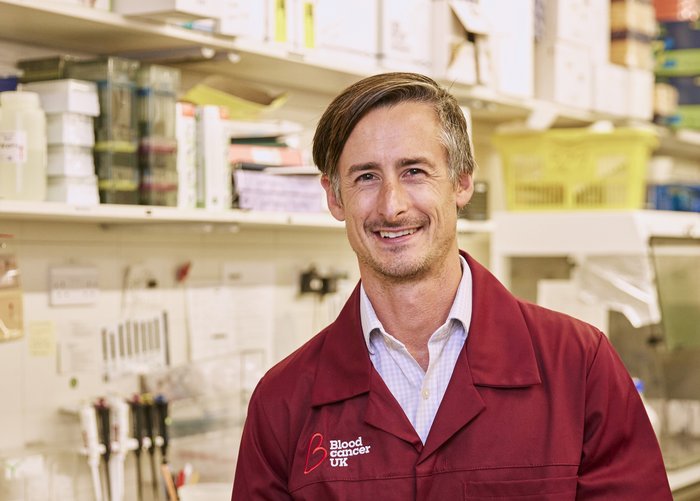Developing a more effective CAR-T therapy to treat myeloma
CAR-T therapy has been shown to be an effective treatment for myeloma but unlike other cancers this treatment is used for, these CAR-T cells don’t remain in the body long-term, which means people see their myeloma return. Dr Maciocia hopes to make CAR-T cells that last longer so that people with myeloma remain cancer-free.

Dr Paul Maciocia smiling in the lab wearing his lab coat
The challenge
Myeloma is a type of blood cancer that can be treated but currently has no cure. CAR-T therapy is a type of cancer treatment that harnesses our immune system to kill cancer cells. It is often used when other treatments haven’t worked. This treatment involves taking T-cells (blood cells that help to protect you from infection and disease) out of the blood, modifying them in a lab and then giving them back to the patient to seek out and destroy the cancer. CAR-T therapy has been effective in treating myeloma, but unlike when it used for other blood cancers, these CAR-T cells don’t remain in the body in the long term, meaning the cancer always comes back.
The project
Our bodies can produce small proteins that can work with CAR-T cells and help them to last longer in the body. However, at the moments we don’t know what these small proteins are. If we did, scientists could increase the level of this protein, to make sure the CAR-T cells last as long as possible, and this is something Dr Maciocia and his team want to work out. If the CAR-T cells survive longer they can continue their surveillance in the body and destroy any cancerous cells they might come across. In this project, Dr Maciocia will conduct experiments to discover the small proteins that will make CAR-T cells survive longer in people with myeloma. His team have previously conducted experiments and developed models and techniques in the lab to create CAR-T cells that will benefit patients with myeloma. They want to combine this with this new knowledge from these experiments to create CAR-T cells that survive longer in the body for people myeloma.
The future
If successful, it is hoped that Dr Maciocia and his team will create a CAR-T therapy that is long-lasting and effective in people with myeloma. This could lead to a future where CAR-T cells are able to survive in the body and continue to destroy any cancer cells so people with myeloma won’t see their disease return and will remain cancer-free. This could provide a long-awaited cure for the many people who live with this life-long disease.
Funding
This project is funded by the Matthew Wilson Multiple Myeloma Fund at Blood Cancer UK.
